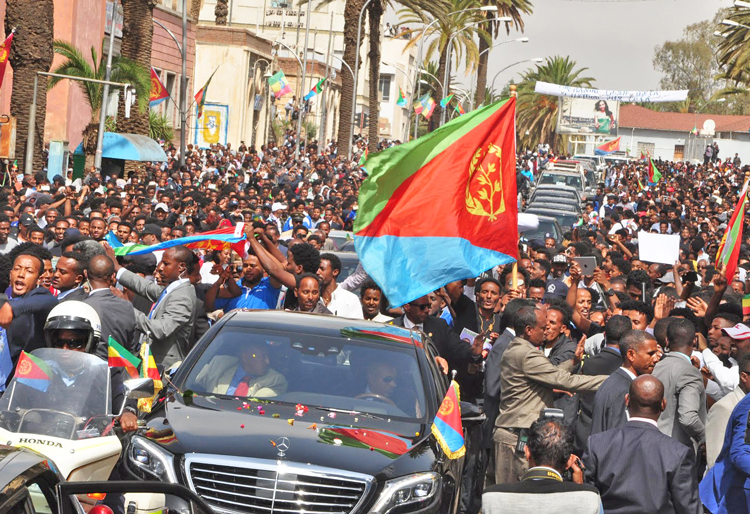After two decades of war and conflict, the rulers of Ethiopia and Eritrea signed an agreement to normalize relations July 9. Washington backed the initiative in an effort to bring capitalist stability and promote the U.S. rulers’ interests in the Horn of Africa, one of the world’s busiest shipping lanes.
This development is good for working people, creating political space to discuss, debate and organize to advance their class interests.
Ethiopian Prime Minister Abiy Ahmed traveled to Eritrea the previous day for a summit with President Isaias Afwerki, the first such meeting between leaders of the two countries in 20 years.
In addition to reopening embassies, flights between the two countries are being restored and direct telephone calls permitted. The agreement opens the door for landlocked Ethiopian producers to start using Eritrea’s Red Sea ports.
Donald Yamamoto, then U.S. acting assistant secretary of state for African affairs, had met with government leaders in both Eritrea and Ethiopia at the end of April to push for an accord. It was the first visit by a top U.S. official in many years.
Also promoting the accord were the governments of Saudi Arabia and United Arab Emirates, each of which has close ties with Eritrea and investments in the area, as well as Qatar, which has relations with Ethiopia. As a convoy of vehicles brought Ahmed from the airport to downtown Asmara, Eritrea’s capital, he was met by cheering crowds — an expression of support for ending the yearslong conflict and the devastation it inflicted on working people.
For toilers in Eritrea these openings could mean the end of hated mandatory conscription, which has disrupted the lives of millions, and a halt to suppression of the press and democratic provisions in the constitution that were suspended, including all elections since 1998.
On July 14 Eritrean President Afwerki flew to Addis Ababa, Ethiopia’s capital, where crowds turned out to hail the agreement. Demonstrators “lined Addis Ababa’s streets, waving both countries’ flags and chanting antiwar slogans,” reported the Washington Post.
The Ethiopian rulers are requesting the U.N. lift sanctions it helped put in place against Eritrea in 2009 for its alleged support for the opposition Somali Islamist movement. Responding to these developments, Somali President Mohamed Abdullahi Mohamed visited Eritrea July 30 and signed an agreement to establish diplomatic relations, which had been broken off 15 years ago.
Ahmed, 42, a former army officer, became Ethiopia’s new prime minister in March after his predecessor resigned amid widespread protests. Ahmed has freed hundreds of political prisoners, and extended amnesty to those charged with treason and other political crimes. At his request parliament lifted the longstanding state of emergency there.
On Aug. 7 the Ethiopian government signed an agreement to end hostilities with rebels from the Oromia region of the country, who have been fighting for self-determination since the 1970s. Oromo is the country’s largest ethnic group, comprising 34 percent of the population. Ahmed is the first Oromo to become prime minister, defusing resentment that for many years the government was controlled by Tigrayans, who make up just 6 percent of the population.
Washington seeks to counter Beijing’s role in Ethiopia — as elsewhere in Africa — where it has major investments and owns most of the country’s massive debt. Ahmed has pledged to partly privatize state-owned enterprises, including Ethiopian airlines, in a drive to increase ties with Washington and other imperialist rulers in Europe.
U.S. rulers interests in Africa
The U.S. capitalist rulers have stepped up efforts to advance and protect their investments and markets in Africa. In 2007 they established the U.S. Africa Command, a military command dedicated to operations across the continent. Washington maintains a sizable base in Djibouti, which borders on Ethiopia, Eritrea and Somalia, and sits directly across the straits from Yemen.
Ethiopia’s 105 million people make it the second most populous country in Africa. More than 80 percent live in rural areas. A quarter of the population lives in poverty, subsisting on less than $2 a day.
Eritrea, a country of 6 million people, was freed from Italian colonial control in 1941, but ruled by the British for the next 10 years. In 1952 it was seized by Ethiopia’s rulers and forcibly annexed as a province 10 years later. This sparked a 30-year struggle for independence. Eritrean rebel forces were victorious in 1991.
In 1998 fighting erupted again over disputed border areas near the small town of Badme. The rulers in both countries massively increased their armies, to some 300,000 each, including the imposition of the mandatory conscription system in Eritrea. When the fighting ended two years later, over 100,000 had been killed and a million driven from their homes.
The peace agreement established the Eritrea-Ethiopia Boundary Commission, composed of Washington, the European Union, the African Union and the U.N. The commission awarded the disputed territory around Badme to Eritrea, but the Ethiopian government refused to accept this decision and continued to occupy the area. In June 2018, Ethiopia’s new prime minister announced that his government would now “fully accept and implement” the border agreement.
Former rebel commander Afwerki has been in power since 1991. Parliament has not convened since 2002. Mandatory “national service” conscription has led some 5,000 Eritreans to flee the country every month, many joining the massive wave of refugees from Africa and the Middle East seeking passage to Europe. Nearly 170,000 Eritrean refugees also live in Ethiopia.
“We grow up seeing every adult we know get out from their house, go to national service and never come back,” Semhar Gebreselassie, a young Eritrean asylum-seeker who fled the country in 2014, told Al Jazeera. “We don’t want that to happen to us.”
The signing of the peace accord with Ethiopia is raising hopes among working people in Eritrea that these conditions will be changing soon.
Following the agreement, Ethiopian Prime Minister Ahmed flew to Washington, D.C., July 28, where he spoke to thousands of Ethiopians and others. Some 300,000 Ethiopians live in the area.
Thousands of young cab and Uber drivers, airport, restaurant and convenience store workers and others turned out. “This day is historic for us,” Yibel Ashenafi, an electrician from Alexandria, Virginia, told Ned Measel, Socialist Workers Party candidate for House of Representatives from the District of Columbia, who came to talk with workers attending the meeting. “The situation can be better now.”
“Big shifts are shaking the capitalist world order,” Measel said. “Our job as workers is to understand them, and to use the political space that is open for us to advance our class interests.”
Ashenafi subscribed to the Militant and got a copy of The Clintons’ Anti-Working-Class Record: Why Washington Fears Working People by SWP National Secretary Jack Barnes.


